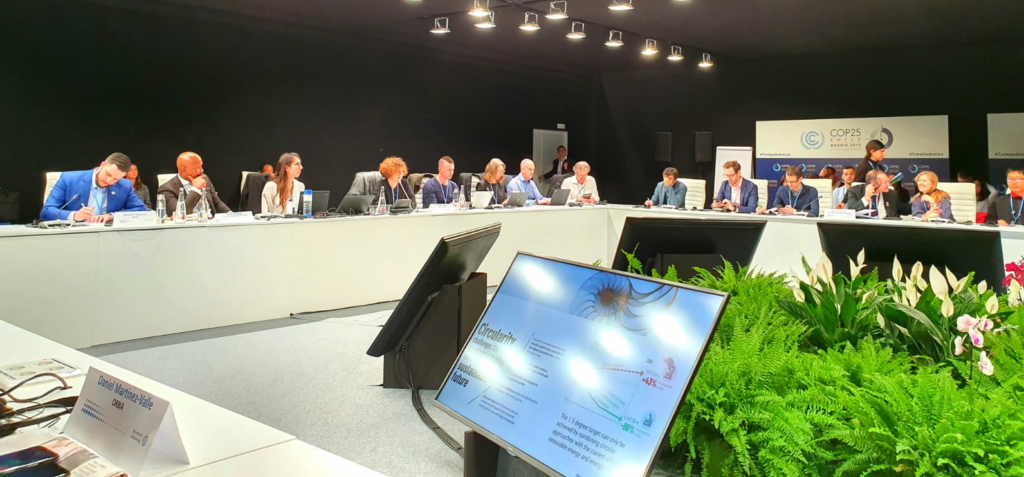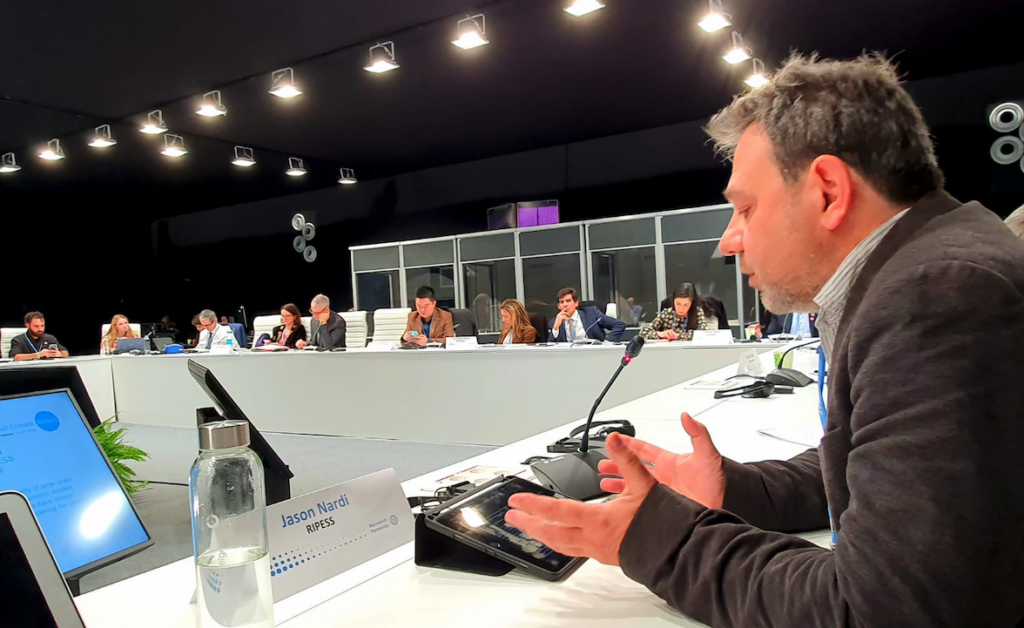The COP25 International Conference took place in Madrid (Spain) from December 2nd to 13th 2019. Jason Nardi, from RIPESS EU and RIPESS Intercontinental Coordinator, was there and participated in the “High-level circular economy roundtable” where he argued that we need a radically different approach to the economy.
Written by Jason Nardi, RIPESS’ Intercontinental Coordinator.
The 25th UN Climate Conference was held in Madrid (instead of Santiago in Chile, where it was supposed to take place) from 2 to 13 December: two weeks of negotiations among representatives of the nearly 200 countries that are parties to the UNFCCC, the United Nations Framework Convention on Climate Change.
During this COP25, states were meant to finalize the rules of implementation of the Paris Agreement signed in 2015, which is supposed to be fully operational from 2020. Moreover, they were to increase the ambition of their emission reduction commitments, which are currently totally insufficient to achieve the objectives and to avoid the most serious consequences of global warming. The negotiations ended over 2 days beyond schedule and with a really weak agreement and substantial failure.

COP 25 was celebrated at the end of a year characterized by strong mobilizations of young people, which raised the attention on the climate crisis and the inaction of States to levels never reached before. Half a million people took to the streets in Madrid on Friday 6 December, calling for climate justice and responsibility of world governments. It was followed by the Climate Social Summit, the civil society event that saw more than 300 appointments promoted by activists from all over the world to propose alternative solutions, which ended with a statement titled: “The world has woken up to the climate emergency“.
Among the many spaces in the Social Summit, there was the Minga Indígena, organized by representatives of indigenous communities to talk about the impacts of climate change on their territories. Even though the official negotiations have moved to the Europe, South American civil society did not give up its space for expression, and in Santiago the two planned meetings of the Cumbre de los Pueblos and the Cumbre Social por la Acción Climática were celebrated.
RIPESS participated in both the official COP25 (see below the intervention of RIPESS coordinator Jason Nardi at the High level debate on “Circular economy, cities and buildings” in collaboration with FMDV and ICLEI) and in the Climate Social Summit, in several meetings organised by allies such as ECOLISE and members as REAS Madrid.
Next year’s COP, scheduled to take place in Glasgow between 9 and 19 November 2020, will be the final test for governments around the world. Mobilising our networks, movements and organisations at all levels is more crucial then ever to put more and more pressure on political representatives and governments who pull back from assuming their responsibilities and continuing to pursue a polluting, extractivist and destructive economic model, instead of taking real action to change it. And we need to link the mobilisation to the “transformative economies” that will gather in Barcelona at the WSFTE (June 25th-28th 2020).
In this sense, the number of legal actions brought by citizens and organisations against polluting states and companies is multiplying, calling for climate justice and the protection of fundamental human rights – the recent case won by the Urgenda foundation vs the Netherlands’ government is exemplary.
But even more hopeful are the positive actions taken at the local level and the potential of trans-local collaborations, involving cities who are investing in circular and social solidarity economy, where organised citizens, responsible governments and enterprises and other stakeholders can collaborate to build the climate resilient economic system and society we urgently need.
High-level circular economy roundtable: Cities and buildings as agents of climate action

Speech of Jason Nardi, RIPESS Intercontinental Coordinator
Three quarters of resource-use and greenhouse gas emissions already come from cities, and trends in urbanization, motorization, population and economic growth will further drive up these numbers if we don’t get smarter and more sustainable in the way we live, consume, travel, and produce. Many cities face serious air, water and waste pollution; direct result of unsustainable consumption and production patterns, making citizens’ health a key imperative for action. Yet, the key to unlocking cities potential extends far beyond that: it is about raising political ambition, a constructive collaboration between different levels and sectors of government, innovative housing, urban and climate policies, sound economic incentives, and better urban planning. It is integrated and coordinated action of stakeholders such as innovators, policymakers, investors, developers, among others that will accelerate impact to help achieve the Paris Agreement goals.
(From the introduction to the Rountable)
1) From “Smart” to collectively intelligent cities
Many if not most of today’s larger cities are ecologically unsustainable and socially unjust (concentration of emissions, pollution, bad quality housing, non resilient and very dependent from centralised provision – like energy, waste, transportation, etc.) and need to be re-designed all together, downsized and re-built. They were planned or transformed around carbon intensive market-driven models, excluding many inhabitants and their communities, especially those living on informal economies as the majority of realities in the global south (60% average). If cities are like organisms, they should only grow to their natural limit, bioregional, livable and future capable. Perhaps less “smart” and more collectively intelligent.
That is why other more eco-systemic and fair approaches are needed: Social Solidarity Economy (SSE) and finance are based on circular economy, from the bottom up, with long tested and innovative solutions adapted to very different contexts. They are done with collective, cooperative shared intelligence and efficient use of existing resources, recreating agro-ecological and re-localised supply chains.
Deregulated extractive linear economic growth and global financialised “free market” competition are among the root causes of the ecological and climate emergency we are in, let alone the inequality and poverty gaps they generate.
Greening economic growth does not make it more sustainable and a true circular economy is incompatible with today’s economic system. We need a just transition to a living economy, where we produce and consume less, reuse, repair, redistribute and regenerate more. “Circular” without social economic rights is not viable.
2) Including marginalised communities and informal workers in circular dynamics
Informal workers account for 50 to 80 percent of urban (self) employment of the global south. Yet they are largely excluded from public infrastructure and services, public space, and public procurement contracts. They are already contributing to a circular resilient low carbon economy, but rarely recognized nor supported or offered financial means, starting with women, who are half the population.
We need a radically different approach to the economy, based on decentralized and collective ownership, cooperative and democratic organization and management, short supply chains and local solidarity economic circuits. This has proven to work in many cases all over the world.
There are thousand of examples where collaboration between informal, solidarity economy and cooperative enterprises and finance with local governments have been successful in giving answers to both social, urban and environmental issues – and contributing to a low-carbon human activity.
A few examples:
Bamako in Mali has been working on transforming 50000 tons of solid waste into fertilizer and energy. The municipality, SSE structures and peasant organisations are all involved. Waste for composting is recovered from markets, schools, etc. it’s at the beginning but promising.
In Solapur, India the women-led beedi and textile workers housing cooperative together with the workers union has built almost 16000 houses (and other 30000 are on the way) made for climate local conditions, with materials locally sourced, participation of the workers, who from renting slum huts became owners of their sustainable homes in a town they built, with support of the local government and with community services, schools, hospitals and local farmers market (they won the Transformative cities award, 2018).
3) Right to the city and the New Urban Agenda
This is what we call Right to the city recognized by Habitat III’s New Urban Agenda: participatory urban planning by and for people and communities, inclusive, fair and sustainable cities, creating de-commodified spaces for local economic circuits, food and energy sovereignty and urban commons. And larger alliances, such as those among cities (as iclae) or built among States and the UN, such as the Global alliance launched by France.
In order to do this, there needs to be the political will and courage to (re) municipalise essential public services and infrastructures, with public-community partnerships and democratic control and management: enabling community coop housing and land-trusts, citizen-controlled water, decentralised energy production, shared and public mobility, circular waste mgmt and low-emission and resilient alternatives for the building and construction sector, with a special focus on the use of local materials and knowledge, community fab-labs and maker spaces and inclusion of most vulnerable population groups.
Market-led solutions have failed in most cases – it is time to act giving control back to the people, for a just, socially inclusive and healthy society.
That is what circular economy is and should be.



Leave A Comment